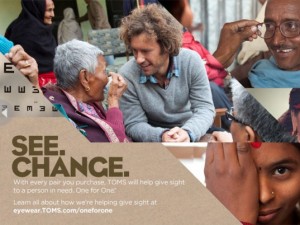One for one business models while externally viewed as helping developing countries, actually hurt local businesses and deprive them from selling their goods and services. While they do provide citizens with free goods and services, the local providers are robbed of their business, and will suffer from the lack of consumers. The inconsistency in shipments for companies with one for one business models also harm developing economies, as they hinder growth and can create holdups in the market of local companies.

For-profit based company Toms advertises their one for one business strategy
Countries in poverty “aren’t poor because they lack stuff; they’re poor because they lack the infrastructure to create wealth“. Through the growing popularity of one for one corporations, this will only serve to further cripple these countries. Only through the implementation of providing goods and services currently unavailable, will these companies be actually helping. By funding the development of medicines and vaccines and their distributions, companies and their consumers can assist developing countries without the disturbance of pre existing markets trying to grow.

Free Vaccinations in Africa funded by international companies
References:
The One-for-one Business Model: Avoiding Unintended Consequences